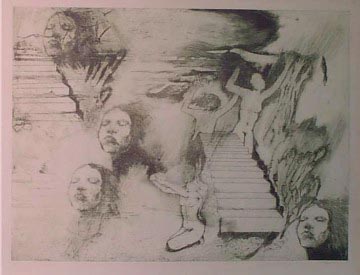For over 35 years, Enid Vien has been a student of Humanity. Her searches have taken her through many philosophical, religious, and metaphysical pathways to the melding of method and magic that so characterizes her work today. She likes to call herself a pragmatic philosopher.
The following chapter from her book, Mood Swings is © 2001 by Enid Vien. For reprint rights, please contact Enid Vien
![]()
Being True to Oneself
Integrity is the state of being whole, it is the first step to reaching a state where your body, mind, heart and soul are all in harmony with each other. In order to be in a state of integrity, you have to know what code of ethical behavior to hold to be correct. This does not necessarily mean following a moral code someone taught you, although it might. It means knowing what you believe and walking your talk.
What do you consider important in life? What makes you feel whole and complete? What makes you feel muddy or impure? What makes your spirits soar? What makes you feel proud of yourself?
Every person has his or her own set of rules that he or she believes in, holds true and valuable. It has been said that one man’s virtue is another man’s sin, so it is important for each of us to examine and actually follow the rules we have been creating all along.
When a person breaks one of their own rules they are weakened and no longer in the State of Integrity. They feel less worthy, less deserving of good fortune and less confident in even the smallest matters. It shakes their self-esteem and makes them uncomfortable with who they are.
When one is weakened in this way, one is easily influenced by the ideas and opinions of others, because one does not know what one believes. One can “sell one’s soul” by seeking acceptance by others and agreeing with ideas and doing acts or condoning behavior which violates one’s own code of ethics. This is another cause for mood-swings. One is not standing on a firm ethical foundation.
During our teenage years most of us struggle with the concept of “belonging.” We wish to have friends, be part of a group, be popular, be accepted. Often it is during this stage of our lives that we being to lose our integrity. In our desire for acceptance we sometimes seem to lose ourselves, trying to become like the rest in our crowd. When a person does this, he starts creating a synthetic identity, one which fits the ideas of the group. After awhile, he forgets he is doing this and the synthetic identity runs on automatic. By now, he thinks it is him.
If the group is into rock and roll, he is into rock and roll, if the group is into body piercing or drugs, he is into body piercing or drugs. The dreams and hopes he had as a child along with his high ideals have become submerged, hidden behind his synthetic personality. The dreams are still there though, and every time he does something which violate his ideas and dreams he suffers a further shattering of his inner self.
By the time he is old enough for marriage this synthetic personality has become second nature and he marries someone who is wearing a synthetic personality of her own. They have not actually met. Only their facades have connected. Inevitably, they both feel misunderstood. Hungry for love and acceptance, they make more and more demands upon each other. It isn’t satisfying because the love and acceptance is not reaching the inner being and so they keep on trying to scratch that itch.
The unseen factor in all this is that the true identity of the individuals is submerged. When they created the synthetic identities they had basically believed, “Who I am is not good enough to be liked by others.” This initiated a life of pretending to be somebody else, a different character with the same name.
The desire for acceptance and admiration is a very strong motivating factor here, but along with the desire came the self-destructive idea that one must be a certain way in order to get the acceptance. Teenagers, all wresting with the problem of how to be, can be very cruel to any group member who is different or unusual, like chickens pecking the one of a different hue, they ridicule and attack the odd one out. This strengthens the idea that individual personality traits and different beliefs must be concealed. Further, it reinforces the notion that one must present a good, although false, face to the world.
When an individual is in this state of being, it is very possible that the highs and lows correspond to being more or less his true self. So when he is being and acting more like his inner self, he is happier, and when he is wearing his false face he is miserable. You can even hear people saying “I don’t feel like myself today.”
An examination of your ideas and beliefs when you were growing up can be quite revealing. you start to find yourself again. Sorting out these beliefs from the ones you adopted through eternal influences and adverse experience can be even more revelatory.
Choose a subject you have had trouble dealing with, for example: Keeping a job, or keeping a boyfriend.
Note down who the people were who had some influence on your thinking in the area chosen. Select the one you feel most emotional about.
Ask yourself:
- Regarding jobs, what influence from _____ was acceptable?
Note it down.
Then ask:
- Regarding jobs, what influence from ____ was unacceptable?
Note it down.
Keep working these two questions back and forth until you have sorted out what you really believe from what you would prefer to reject or revise.
Then choose another subject and work it over in the same fashion.
You can as many subjects as you wish.
We create ourselves from our beliefs, so this helps you sort out who you really are from what you have allowed yourself to become. This simple procedure is effective on anyone. You do not need to be in a state of falsity for it to be of use.


